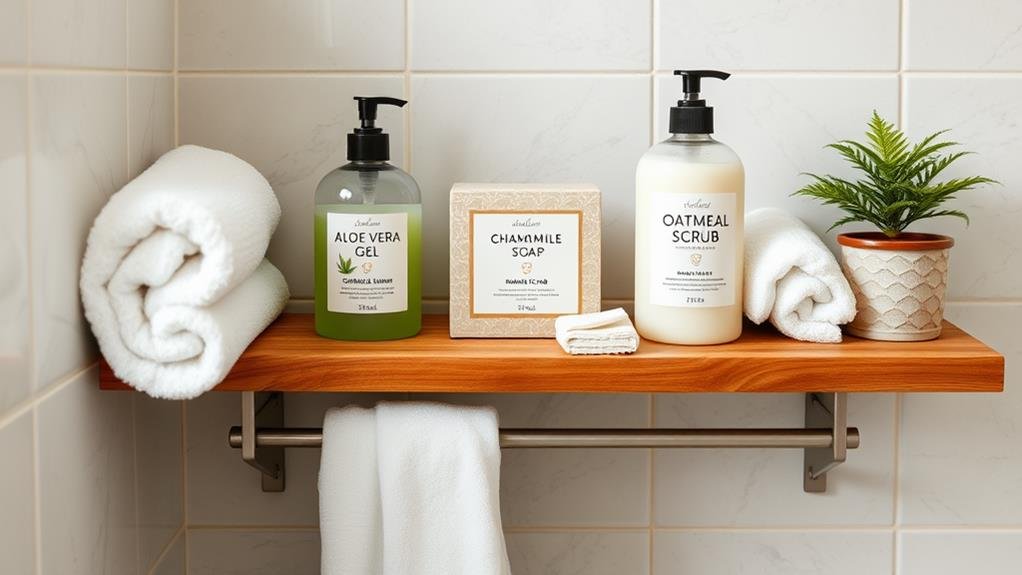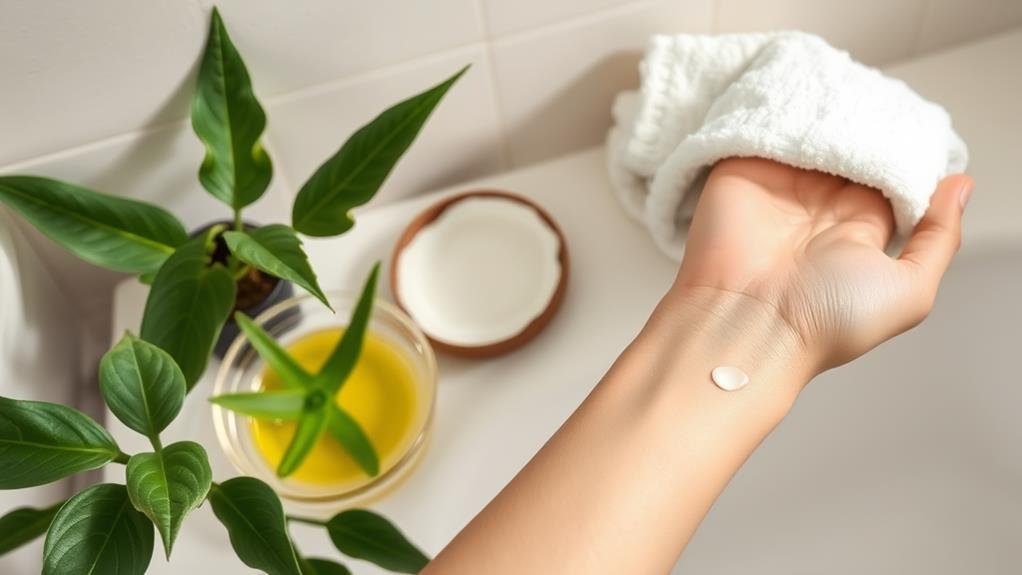
For natural grooming solutions for sensitive skin, focus on gentle, non-irritating products. Choose hypoallergenic cleansers with soothing ingredients like aloe vera and chamomile. A nourishing moisturizer containing calming herbal extracts helps maintain hydration. You might also consider natural exfoliation techniques using oatmeal or sugar scrubs to remove dead skin cells without irritation. Essential oils like lavender and chamomile can enhance skin healing but remember to patch test first. When shaving, opt for natural creams and sharp blades to prevent nicks. These strategies can profoundly impact your skin's comfort, and there's more to explore for optimal care.
Key Takeaways
- Opt for gentle, hydrating cleansers containing natural ingredients like aloe vera and chamomile to soothe sensitive skin during cleansing.
- Use moisturizing products enriched with nourishing oils such as jojoba or coconut oil to maintain skin hydration and protect the skin barrier.
- Incorporate homemade masks with ingredients like oatmeal and honey to provide hydration and relief without harsh chemicals.
- Choose natural shaving solutions, including sharp blades and shaving creams made from aloe vera or shea butter, to minimize irritation.
- Always perform patch tests with new products, especially essential oils, to ensure compatibility and prevent adverse reactions.
Understanding Sensitive Skin

Understanding sensitive skin is crucial for effective skincare. When your skin reacts negatively to certain products or environmental factors, identifying the underlying skin sensitivity triggers becomes essential. Common triggers include harsh chemicals, fragrances, extreme temperatures, and allergens. Recognizing these factors helps you tailor your skin care routines to minimize irritation and maintain a healthy complexion.
Your approach should focus on gentle ingredients and non-irritating formulations. Opt for products labeled as hypoallergenic or formulated specifically for sensitive skin. Reading ingredient labels is vital; avoid sulfates, alcohols, and artificial additives that could exacerbate your condition.
Establishing a consistent skin care routine is key. Start with a mild cleanser, followed by a soothing moisturizer designed to protect your skin's barrier. Incorporating a broad-spectrum sunscreen is also essential, as sunlight can be a significant sensitivity trigger.
You should also consider patch testing new products before full application. This simple step can help you identify potential reactions and prevent discomfort.
Benefits of Natural Ingredients
Natural ingredients offer significant benefits for your sensitive skin.
Soothing plant extracts can calm irritation, while nourishing oils provide essential hydration without harsh chemicals.
Soothing Plant Extracts
In recent years, the demand for soothing plant extracts in skincare has surged, particularly among those with sensitive skin.
You're likely seeking effective solutions that provide relief without irritation. Soothing plant extracts, often derived from calming botanicals, can offer a natural alternative to synthetic ingredients.
Here are three key benefits of incorporating these extracts into your skincare routine:
- Anti-Inflammatory Properties: Many herbal infusions, such as chamomile and calendula, are renowned for their ability to reduce redness and inflammation, providing immediate comfort to irritated skin.
- Hydration: Extracts like aloe vera not only soothe but also hydrate, helping to maintain your skin's moisture barrier without the use of heavy, synthetic moisturizers.
- Antioxidant Effects: Botanicals such as green tea contain powerful antioxidants that protect your skin from environmental stressors, promoting overall skin health and resilience.
Nourishing Oils Benefits
When it comes to skincare for sensitive skin, nourishing oils offer a wealth of benefits that can enhance your routine. These oils, derived from natural sources, are rich in essential fatty acids, vitamins, and antioxidants that promote overall skin health.
One of the primary advantages of using nourishing oils is their ability to improve skin absorption. Unlike heavier creams, these oils penetrate deeply into the skin, delivering nutrients where they're needed most.
You'll find that oils like jojoba, almond, and argan are particularly effective for sensitive skin. They not only hydrate but also create a protective barrier, locking in moisture and preventing irritation. This is crucial for maintaining your skin's natural balance, especially if you tend to react to synthetic ingredients.
Additionally, nourishing oils have anti-inflammatory properties, which can soothe redness and discomfort. By incorporating these oils into your skincare regimen, you empower your skin to heal and rejuvenate naturally.
Ultimately, the use of nourishing oils can transform your approach to sensitive skin care, offering you the freedom to embrace your natural beauty without compromise.
Chemical-Free Formulations
Embracing nourishing oils sets the stage for exploring the benefits of chemical-free formulations in skincare.
By choosing products that prioritize natural formulation techniques, you can significantly enhance your skincare routine, especially if you have sensitive skin.
Here are three key chemical-free benefits to consider:
- Reduced Irritation: Natural ingredients tend to be gentler on the skin, minimizing the risk of allergic reactions and irritation. This is particularly important for those with sensitivities.
- Enhanced Moisture Retention: Chemical-free formulations often include humectants like aloe vera and glycerin, which attract moisture and keep your skin hydrated without the drying effects of synthetic additives.
- Sustainable Choices: Opting for natural ingredients supports eco-friendly practices, as these products typically avoid harsh chemicals that can harm the environment.
Gentle Cleansing Options

How can you effectively cleanse sensitive skin without causing irritation? The key lies in choosing the right products.
Opt for hydrating cleansers that maintain your skin's moisture while removing dirt and impurities. Look for formulas enriched with natural ingredients like aloe vera or chamomile, which can help soothe and calm your skin during the cleansing process.
It's also crucial to consider the pH balance of your cleanser. Sensitive skin often has a disrupted pH, leading to increased irritation. Select a gentle cleanser with a pH level close to that of your skin, ideally between 4.5 and 5.5. This ensures the product cleanses effectively without compromising your skin's natural barrier.
Avoid harsh ingredients such as sulfates and artificial fragrances, as these can exacerbate sensitivity. Instead, focus on creamy or oil-based cleansers that provide hydration while lifting away impurities.
When cleansing, use lukewarm water, as hot water can strip your skin of essential oils.
Soothing Moisturizers
When selecting soothing moisturizers for sensitive skin, it's crucial to choose gentle ingredients that won't irritate.
Consider applying these products using techniques that minimize friction and enhance comfort.
Doing so can significantly improve your skin's hydration and overall health.
Gentle Ingredients to Consider
For those with sensitive skin, choosing the right soothing moisturizer can make a significant difference in comfort and overall skin health.
When selecting a product, focus on gentle ingredients that provide both hydration and protection without irritation. Here are three key components to consider:
- Calming Herbs: Ingredients like chamomile, calendula, and aloe vera are known for their anti-inflammatory properties. They help to soothe irritated skin and reduce redness.
- Gentle Fragrances: Opt for products that use natural, subtle scents rather than synthetic fragrances. Essential oils like lavender or rose can offer a pleasant aroma while being less likely to cause irritation.
- Hydrating Oils: Look for moisturizers containing oils such as jojoba, coconut, or argan oil. These oils mimic your skin's natural sebum, providing essential moisture without clogging pores.
Application Techniques for Comfort
Applying soothing moisturizers correctly is essential for maximizing their benefits, especially for sensitive skin. First, ensure your hands are clean before applying any product. This minimizes the introduction of irritants.
Use gentle application methods; rather than rubbing, employ a patting or dabbing technique. This reduces friction, which can exacerbate sensitivity.
When using soothing moisturizers, consider the temperature of the product. Applying it at room temperature, rather than straight from the fridge or heated, can enhance comfort.
Additionally, practice comfort techniques like applying the moisturizer after a warm shower. The steam opens your pores, allowing for better absorption.
For optimal results, apply the moisturizer on slightly damp skin. This traps moisture in and enhances the product's effectiveness.
Use a small amount at first; you can always add more if needed. Don't forget to focus on particularly dry or irritated areas, gently massaging the moisturizer in with your fingertips.
Lastly, allow the product to absorb fully before applying other skincare products.
Consistent application of these techniques will ensure your sensitive skin remains hydrated and soothed, promoting overall comfort and well-being.
Natural Exfoliation Techniques

Gentle exfoliation is essential for maintaining healthy skin, especially for those with sensitive conditions.
You can effectively remove dead skin cells and promote cell renewal using natural ingredients, ensuring your skin remains vibrant without irritation.
Here are three effective natural exfoliation techniques:
- Sugar Scrub: Combine equal parts of sugar and a carrier oil, like coconut or olive oil. This mixture gently polishes your skin while providing hydration. Use it once a week for best results.
- Coffee Grounds: Coffee grounds aren't just for your morning brew; they make an excellent exfoliant. Mix them with a little water or yogurt to form a paste, then massage it onto your skin in circular motions. This technique not only exfoliates but also helps improve circulation.
- Oatmeal: Ground oatmeal is another gentle option. Mix it with warm water to create a paste. Apply it to your face, leave it on for about 10 minutes, and rinse. This method soothes while exfoliating, making it ideal for sensitive skin.
Incorporate these techniques into your routine to enjoy smoother, healthier skin without compromising your sensitivity.
Homemade Face Masks
Creating homemade face masks can be an effective way to soothe sensitive skin.
You can incorporate gentle, natural ingredients like oatmeal, honey, and aloe vera to provide relief and hydration.
In the following sections, you'll find easy DIY recipes to help you craft your own soothing masks.
Soothing Ingredients to Use
Several natural ingredients can effectively soothe sensitive skin when used in homemade face masks. These ingredients not only provide relief but also enhance your skin's overall health. Here are three key ingredients to consider:
- Aloe Vera: Known for its anti-inflammatory properties, aloe vera gel can hydrate and calm irritated skin, making it an excellent base for face masks.
- Chamomile Tea: This gentle herb can be brewed and cooled, then used as a soothing liquid in masks. Its anti-inflammatory and calming effects help reduce redness and irritation.
- Honey Masks: Honey acts as a natural humectant, drawing moisture into the skin while its antimicrobial properties help to prevent breakouts.
Additionally, you might want to explore other soothing options like calendula cream, which promotes healing, or coconut cream, rich in fatty acids to nourish and moisturize.
Incorporating lavender oil or rose water can further enhance relaxation and promote a sense of well-being.
Lastly, consider adding oats for their soothing qualities, especially after an oatmeal bath.
These ingredients collectively support your desire for natural, effective solutions for sensitive skin, providing you with the freedom to nurture your skin naturally.
Easy DIY Recipes
When you want to pamper sensitive skin, easy DIY face masks can offer effective relief and nourishment. These masks often utilize natural ingredients that are gentle yet effective.
For instance, you can create a soothing mask using plain yogurt and honey. Mix one tablespoon of each, apply it to your face, and leave it on for 15 minutes. This combination boasts antibacterial properties while providing hydration.
Another option is a soothing balm made with aloe vera and cucumber. Blend half a cucumber with two tablespoons of aloe vera gel. The cooling effect of cucumber combined with aloe's healing properties helps reduce redness and irritation.
You might also consider herbal infusions, like chamomile or green tea, as a base for your masks. Brew a strong infusion, let it cool, and mix it with oatmeal to create a calming paste. Apply this mask for 20 minutes to soothe and rejuvenate your skin.
These easy DIY recipes not only allow you to avoid harsh chemicals but also empower you to customize your skincare routine, ensuring that your sensitive skin receives the gentle care it deserves.
Essential Oils for Sensitive Skin

For those with sensitive skin, the right essential oils can provide soothing benefits without causing irritation. Incorporating essential oils into your skincare routine can help you maintain comfort and balance.
Here are three essential oils you might consider:
- Lavender Oil: Known for its calming properties, lavender benefits include reducing redness and inflammation. Its gentle nature makes it suitable for even the most delicate skin types.
- Chamomile Oil: The chamomile properties are particularly beneficial for soothing irritation and promoting skin healing. Its anti-inflammatory effects can help alleviate conditions like eczema or dermatitis.
- Tea Tree Oil: While it's renowned for its antibacterial properties, tea tree oil can also help with skin irritation and redness. Just be sure to dilute it properly, as it can be potent.
When using essential oils, always perform a patch test to ensure your skin responds positively.
Diluting oils with a carrier oil can enhance their benefits and minimize potential reactions. By choosing the right essential oils, you can enjoy the freedom of a soothing skincare experience tailored to your sensitive skin needs.
Natural Shaving Solutions
Natural shaving solutions can significantly enhance your grooming routine, especially if you have sensitive skin. By choosing the right products and techniques, you can minimize irritation and achieve a smooth shave.
Consider using razor alternatives, such as safety razors or straight razors. These options often provide a closer shave while reducing the risk of nicks and cuts. Additionally, they require less pressure, which is beneficial for sensitive skin. When utilizing these alternatives, ensure your blade is sharp to prevent tugging, which can exacerbate irritation.
Incorporating natural shaving creams is equally crucial. Look for creams containing soothing ingredients like aloe vera, coconut oil, or shea butter. These components hydrate your skin, creating a protective barrier that helps reduce friction during shaving.
Avoid products with synthetic fragrances or harsh chemicals, as they may trigger allergic reactions or further irritate your skin.
Ultimately, embracing these natural shaving solutions empowers you to take control of your grooming routine. By opting for gentle methods and high-quality ingredients, you can achieve a comfortable and effective shave, allowing you to feel confident and free in your skin.
Tips for Patch Testing

Before applying any new product to your sensitive skin, conducting a patch test is essential to ensure compatibility and avoid adverse reactions.
Patch testing helps you identify potential skin reactions before fully committing to a product. Here are some tips to guide you through the process:
- Select a Test Area: Choose a small, discreet area of skin, such as behind your ear or on your inner forearm. This spot should be easy to monitor for any changes.
- Apply the Product: Use a small amount of the product on the chosen area and allow it to absorb for a few minutes. Avoid applying other products in that area during the test to ensure accurate results.
- Monitor for Reactions: Wait 24 to 48 hours to observe any skin reactions. Look for signs like redness, itching, or swelling. If you notice any of these symptoms, it's best to avoid using the product.
Lifestyle Changes for Skin Health
Making intentional lifestyle changes can significantly improve your skin health, especially if you have sensitive skin. Start with dietary adjustments; incorporating anti-inflammatory foods like fruits, vegetables, and healthy fats can enhance your skin's resilience.
Don't underestimate hydration habits either; drinking adequate water helps maintain skin elasticity and overall health.
Stress management is crucial as well. High stress levels can exacerbate skin issues, so consider techniques like mindfulness or yoga to promote relaxation.
Prioritizing sleep quality is equally important; aim for 7-9 hours of restful sleep to allow your skin to repair and regenerate.
Be mindful of environmental factors too. Pollutants can irritate sensitive skin, so consider using air purifiers indoors.
Sun protection is non-negotiable; apply a broad-spectrum sunscreen daily to guard against UV damage.
Additionally, stay informed about allergy awareness. Identify any allergens that may trigger your skin issues and adjust your skincare routine accordingly.
A consistent routine using gentle, non-irritating products can help maintain balance and health. By addressing these aspects, you empower yourself to nurture your skin effectively.
Conclusion
In the realm of skincare, think of natural solutions as a gentle breeze, nurturing your sensitive skin without harshness. By choosing natural ingredients, you're not just treating your skin; you're cultivating a garden of health and vitality. Remember to patch test new products, allowing your skin to communicate its needs. With these mindful choices, you can embrace a routine that promotes balance and harmony, ensuring your skin flourishes like a delicate flower in the sunlight.
